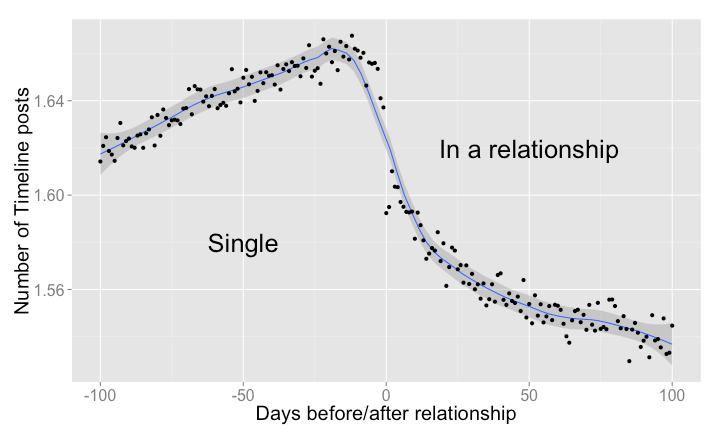
February 26, 2014, by Yvonne Teoh
Facebook’s Got Love On Its’ Mind
It’s remarkable what data from social media can tell us. Case in point, Facebook published a plug post on Valentine’s Day this year, detailing about how they have collected statistical evidence that hints at a budding relationship before the relationship has even started.
Facebook explored interactions between couples before and after the relationship has begun and found that prior to the starting of a relationship, over the duration of 100 days, a “slow but steady increase in the number of timeline posts shared between the future couple” was observed. But when the relationship has started (at a point, they aptly named ‘day 0’), the number of posts began to decrease. This all suggests that during the period of courtship between the two individuals, the number of posts they share increases, but decreases after they make it official.. It is suggested that the fall is due to couples spending more time together and that “online interactions give way to more interactions in the physical world”.
Facebook data scientist, Carlos Diuk, gives more specific numbers: a peak of 1.67 posts per day 12 days before the relationship begins and a lowest point of 1.53 posts per day 85 days into the relationship was observed. To properly see the trend, a graph was provided.
While this may be a downer for those interested in online interactions, Facebook provides another interesting point that might appeal to those with an inner-romantic side. Using unnamed statistical methods to analyse a set of aggregated, anonymized timeline interactions, Facebook Data Science found that the overall content of online interactions get sweeter and more positive when one is in a relationship. The interesting way they discovered this data was by counting the proportion of words expressing positive emotions (e.g. ‘love’, ‘happy’, etc.) minus the proportion of negative emotions (e.g. ‘hate’, ‘hurt’, etc.) A general increase after day 0 of the relationship and a dramatic increase in days 0 and 1 was observed. Though, we didn’t really need statistics to tell us, it is nice to get some official confirmation.
It is also worth pointing out that Facebook only investigated couples that “declared an anniversary date” between April 2010 and October 2013 and only English-speaking users.
While this isn’t exactly ground-breaking science, it does inform us a little bit about the pattern of online social interaction. This blog post is part of a 6-part series that Facebook publishes, following in the path of internet dating site OK Cupid. It is a valuable insight into how data analysis can be used to demonstrate trends that occur in society, and we hope to receive more data from Facebook, which is bound to have a limitless library of interesting data.
Wong Hon Jiun
(Year 3 Student in BSc (Hons) Psychology and Cognitive Neuroscience, UNMC)
-
Post a comment
